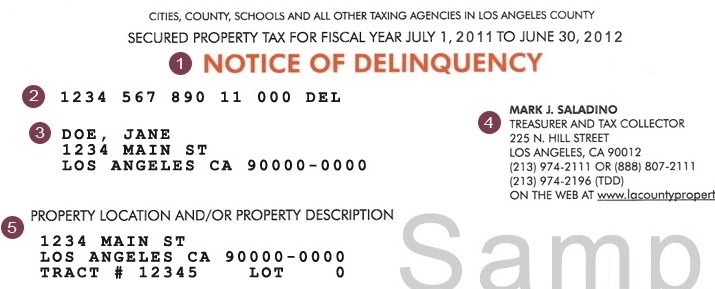You know what they say: There’s nothing certain in life except for death and taxes.
But all jokes aside, people with past-due property taxes are facing a potentially life-altering problem.
When a property owner doesn’t pay his or her property taxes, it makes it difficult for public services to be paid.
The government gives people a certain amount of time to pay them back.
"Sample Past Due Tax Notice"
If they aren't paid, the home will be auctioned for back taxes owed.
This is why more Realtors need to step in to help people who owe delinquent property taxes. After all…Most of these sellers don’t have a lot of options.
If their homes are auctioned, they'll probably sell for a bargain basement price.
Sure, they might get lucky — their homes might sell for full market value at the auction. But you and I know that rarely happens.
What other options do they have? They could sell their homes to a “flipper.” But, how many flippers are willing to pay fair market value?
“But, couldn’t they get a loan?”
Probably not. Most of the people who get behind on their property taxes don’t have good credit. Their chances of getting a loan are slim to none.
These homeowners don’t have a lot of options. This is why they practically give their homes away to flippers.
I just saw a flipper make over a million dollars profit when he flipped a tax lien home.

"Screenshot of the sales history for the Million Dollar Flip."
He bought it for pennies on the dollar. Then, he resold it for a big profit.
People who fall behind on taxes deserve to get a fair price for their homes.
Who is the best person to help them get a fair price?
A Realtor!
Want to start helping these people sell their homes for a fair price? It’s a classic “win-win” scenario.
You help them sell for top market value, and you make a fair commission for helping them.
So, how do you get started?
The first thing you need to do is find the leads.
1. Find People who are behind on their property taxes.
You can find leads through your local county tax collector — either through their website or by going to their office. You can typically find their website by doing a simple search: *Your Area* Tax Collector.
You can either browse the website or call their office. Call them up and say, “How do I get the information on the people that are behind on their property taxes?”
I recommend calling — it’s likely to save you a lot of time clicking around and sending emailed requests that might be ignored.
When I called, someone walked me through how to access those records on the site and for $125, I was able to download an Excel spreadsheet that has every single property in the county.
You can also Google your county’s unpaid tax certificates. Local newspapers often have a website where you can search for information by location. Sometimes a quick Google search can save you lots of time.
Every state is going to be a little bit different. Don’t be afraid to call officials in your county. Their job is to answer your questions and help you out. Sometimes, you’ll get some pushback — people will tell you that information isn’t public or that it’s not available. When that happens, you can do a few things.
- Call back a little bit later, and chances are, someone new will answer the phone who can help you.
- Have whoever answers the phone find their supervisor. They’re likely to know what you can and can’t access.
- Find your state’s public records laws before you call. Give yourself a leg to stand on by knowing exactly what you’re entitled to.
Another thing that works is to make the person who answers feel like a hero. “Hey, I’m really trying to find something. It’s really hard. I don’t know why I can’t find it. Can you please help me out?” They get to feel like a hero because they’re helping you, and you get the information you’re looking for.
In Canada, you can go to a website called canadataxsales.com.
2. Track down their information.
Once you’ve found a house, visit the property appraiser’s website in your area, and enter in the address. You’ll likely find their name and mailing address — if it’s different.
You can find most phone numbers on whitepages.com or just by Googling the person’s name and location. You can also subscribe to a site called Intelius for $20 a month. It gives you access to cellphone numbers, landlines — more than what you’d find on a site like whitepages.com
3. Reach out to them.
Once you’ve got your leads, organize them into a spreadsheet. Work your way down the list and send out letters to each one.
You can modify our letter template, put in your information, and mail it out to the homeowners. If you want to save time, send out the same letter to everyone. Just say, “Dear Friend,” when you’re addressing them.
You can also include a picture of your book cover. If you’ve gotten a proof back from us before, you can save that file and insert it into the document, or take a screenshot of the cover file if you can’t directly save it. If you need help getting this image, feel free to email our support staff, and they’ll be happy to help you out. They’ll also be able to help you with the process of inserting the image into the document.
In your letter, I’d recommend offering them one of the delinquent property tax books. If you want to pick one out, you can go to book-setup.smartagents.com. If you want to order more books, visit smartagents.com/order-books.
Once you send out your letter, some people are going to call you. The letter offers out your book, but not everybody is going to call you back. Don’t send your book to everyone — only those who contact you and show interest. That way, you’re not wasting them.
Here’s why some of these homes are so easy to list:
Many of these properties are inherited homes.
The heirs inherited the home and didn't bother to pay the property taxes. The home is just sitting there with a tax bill accumulating and nothing being done about it. These are slam dunk listings.
If you can reach the heirs, you'll get the listing almost every single time.
- Many of these homes are abandoned. The owners just moved and never bothered to sell it. These are also very easy to list. Why?
- Well, they don’t care enough about the home to pay the property taxes.
- And, since they aren't living there, selling the home is a business decision, rather than a personal decision. It’s much easier to agree to sell a home you don’t live in.
If you haven’t heard from many people, you can call the numbers you found in your research. Make sure you’re talking to the owners. Say, “Hello, my name is Ben. I’m a Realtor here in Jacksonville. I noticed you had a property that had some past due property taxes. I’ve got some information on some different options to help you resolve your tax issues. Do you have a couple of minutes to talk?”
They may or may not say yes. If they agree to speak with you, tell them a little bit about who you are and what you do:
“I educate homeowners on their rights and the different options they have to resolve delinquent property tax issues and help them understand their options to avoid a tax deed foreclosure. When would you have some time where I could meet with you, explain your rights, and show you all the different options available to you, and answer any questions you may have? It takes 30 minutes to go through everything. When do you have 30 minutes available to meet?”
Check out the full script we use to follow up with these leads.
A lot of times, if nothing is resolved, their $140,000 house will be listed as foreclosed and sold for $35,000. Personally, I like to focus on the higher-end properties.
You don’t need to be afraid to call these people. A lot of times, I’ve found that when we’ve mailed out our books, or sent out letters that are offering our books, people are really expecting a call — if they don’t reach out to you first. They’re super friendly and easy to talk to when you finally get them on the phone.
I’ve had sellers say, “Wow. You’re the one that sent me that letter that offered the book. Of course, I’d be interested in talking to you. I need to deal with this issue. I’m behind on my property taxes. I have to sell this house. Thanks for calling me.”
When you’re first starting out, look for the low-lying fruit — the people that are almost guaranteed to want to sell their houses. Once you have your records organized, you can sort them down to just the highest-end part of town. Then, look through your list and find people who aren’t living in their houses (they’ll have a different mailing address). Eventually, they have to sell the house — those are the best leads.
The sad fact is most peoples’ tax problems aren’t going to solve themselves. These people aren’t going to win the lottery. Set a reminder to give them a call every two or three months, and just see how things are going. See if things have changed.
As with any niche, the most important step is to just get started. Find your leads, mail them your letter, and follow up.







